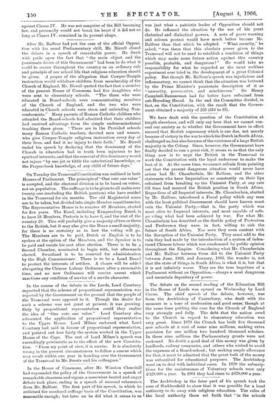In the House of Commons, after Mr. Winston Churchill had
expounded the policy of the Government in a speech of remarkable clearness and vigour, a somewhat heated and angry 'debate took place, ending in a speech of unusual vehemence from Mr. Balfour. The first part of his speech, in which he criticised the manhood suffrage basis of the Constitution, was reasonable enough ; but later on he did what it seems to us
was just what a patriotic leader of Opposition should not do. He inflamed the situation by the use of his great rhetorical and dialectical powers. A note of grave warning and solemn protest would have much better become Mr. Balfour than that which he adopted. "What security," he asked, "was there that this absolute power given to the Transvaal will not be used to establish a condition of things which may make some future action against this country possible, probable, and dangerous ?" He would take no responsibility for what he regarded as the most reckless experiment ever tried in the development of a great Colonial policy. But though Mr. Balfour's speech was injudicious and inflammatory, we cannot think that the situation was bettered by the Prime Minister's passionate description of it es "unworthy, provocative, and mischievous." Sir Henry Campbell-Bannerman had far better have refrained from out-Heroding Herod. In the end the Committee divided, in fact, on the Constitution, with the result that the Govern- ment obtained a majority of 233 (316 to 83).






































 Previous page
Previous page